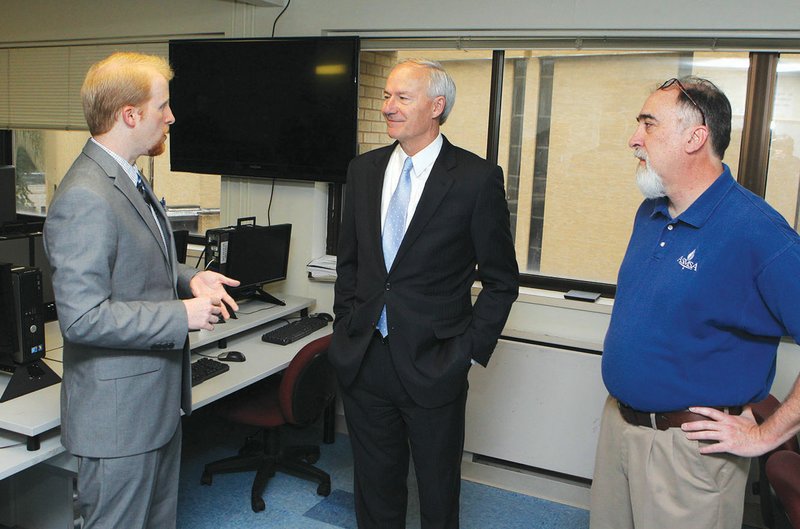Republican gubernatorial candidate Asa Hutchinson discussed state education issues on Thursday as he toured the campus of the Arkansas School for Mathematics, Sciences, and the Arts.
The Greater Hot Spring Chamber of Commerce welcomed Hutchinson Thursday morning for the Good Morning Hot Springs breakfast-speaker series for the business community. The program was held in the Embassy Suites Hot Springs -- Hotel & Spa's Grand Salon.
The ASMSA campus tour took place later that morning and was led by Director Corey Alderdice. Hutchinson spoke of his interest in computer coding as soon as the tour began.
Alderdice explained that the school's students receive credit for graduation from computer sciences courses, which are not included in the Arkansas Department of Education's minimum requirements for graduation.
Alderdice, ASMSA Development Specialist Vicki Hinz and Bob Gregory, dean of academic affairs, led Hutchinson to observe the available technology in the Meade Digital Arts Lab. Gregory and Alderdice said more advanced computer education in schools across Arkansas would help develop strong students before they attended ASMSA.
"If you are gaining access to basic programming in middle school or early high school, then there is no reason that by the end of their senior year of high school that they couldn't be developing mobile phone applications, building games from the ground up and the whole nine yards," Alderdice said.
Alderdice said students may take six semester-long computer classes in their four semesters at ASMSA. Gregory said a number of ASMSA students study computer sciences at UALR.
"Their computer science program is living off of our graduates," Gregory said.
Alderdice said ASMSA welcomes both students who have had access to advanced opportunities prior to attending the school, as well as students who may look to ASMSA for opportunities they would not have had. Hutchinson said he hopes the school and the state continue to expand the opportunities for students.
Hutchinson was interested to learn more about entrepreneurship learning at ASMSA. Alderdice highlighted some of the prominent student research in recent years, including members of Picasolar, a graduate business plan competition team at the University of Arkansas that won a number of awards and prizes in 2013.
ASMSA representatives said the school aims to take what students do in the classroom and extend it out in areas such as research and entrepreneurship. Alderdice said the school is seeking state funding for help with employing a full-time entrepreneurship instructor.
Hutchinson was informed that two-thirds of ASMSA graduates continue their education in the state. Arkansas and the University of Arkansas at Little Rock alternate as the two schools with the most ASMSA alumni. The school's graduates also flock to the University of Central Arkansas and Hendrix College in Conway.
Hutchinson asked how the state could help institutions such as ASMSA. Alderdice said state funding helps with capital construction. He explained that the goal is to demolish the old St. Joseph's Hospital building and construct a new facility that will be visible downtown.
Plans for the school include an academic center and a community hall with lecture space large enough for the full student body. The school's master plan calls for construction further up the hill behind the school and away from downtown.
Hutchinson toured the Student Center that opened in 2012. Alderdice credited much of the school's recent projects to the support of state legislators, such as Sen. Bill Sample, R-District 14; Rep. John Vines, D-District 25; Rep. Bruce Cozart, R-District 24 and Rep. Bruce Westerman, R-District 22.
Gregory said the school has been able to expand on opportunities for students and teachers across the state. Alderdice said it would make more sense for computer education to fall under oversight from the Arkansas Department of Education instead of the Arkansas Association for Career and Technical Education.
"That will happen," Hutchinson said.
Alderdice praised the statewide representation at ASMSA. They explained that teachers must obtain a higher level of certification to teach classes for concurrent credit.
Hutchinson asked if the school had any international students. Alderdice explained that state legislation dictates that ASMSA serve only Arkansas high school students. He said the school has received interest from overseas, especially from China.
"Let's change the law," Hutchinson said. "Because it is a revenue generator."
Hutchinson later touched on his interest in information systems and computer courses near the end of the tour.
"My first exposure was at Homeland Security," Hutchinson said. "You have your technical capacity, but there are all kinds of policy issues surrounding this. One of the biggest issues that faces our country is that we are an information-based society now.
"We accumulate data and how do you manage that data? How do you protect citizens' rights and balance it?"
Hutchinson said his first responsibility at Homeland Security was to negotiate a treaty with the European Union on the exchange of information. He quickly learned that the EU has more strict privacy laws than the U.S.
"When I meet with the EU, they say, 'What is your retention policy?'" Hutchinson said. "I didn't know. I turned to the FBI and asked, 'What is our retention p0licy?' They say, 'We don't have one.' We accumulate data forever. We are not in the habit of getting rid of it."
Local on 08/01/2014
